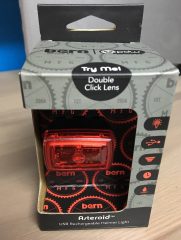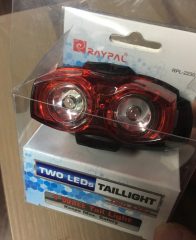
(Photos: J. Maus & PDW)
Just over eight years since he founded Portland Design Works, 37-year-old Erik Olson is about close out one of the toughest ones yet. In the past six months he’s endured the departure of his co-founder and business partner, lagging sales thanks to a global downturn in the bike industry, pesky counterfeiters, and an unexpected cross-town move. Despite these hurdles, Olson is sanguine about the future.
“We’re moving in the right direction as a company,” he shared from the floor of his warehouse on Southeast 21st Avenue during a visit yesterday. They’re located just a stones-throw from the new Lafayette Street Bridge (which he and other employees use with their bikes every day) and the Orange MAX line.

(Photos: J. Maus/BikePortland)
Back in May, Olson settled his company and four full-time employees into a new 3,800 square-foot warehouse and office space. They were previously based in a much larger space on Northeast Hancock (you might have noticed the PDW mural on the west-facing wall as you pedaled up Williams Avenue just north of Broadway) — that is, until a wealthy donor with the Portland Institute for Contemporary Art decided they wanted to buy the building and move in. It was a lot of work to get everything packed up and out with relatively short notice, but in the long run it’s been a positive thing for the company.
Unlike the separated spaces and dark interior offices of their old building, the new offices have lots of natural light and all the employees are close enough to easily talk and exchange ideas — a key ingredient to PDW’s success.
The relatively small brand has established itself in the industry by offering a line of thoughtful and distinctive products. They seem to be in that sweet spot where they’re small enough to be able to quickly dream up new products and improve existings ones, while being large enough to keep inventory high and costs low. Part of the reason for that, Olson shared, is all the products are made in small factories in Taiwan, instead of mega-factories in China.
One of their latest projects is a new collaboration with Bern helmets. Starting in January, the Massachusetts-based company will package, market, and sell the PDW “Asteroid” taillight with a custom mounting kit that snaps into the goggle port at the back of all their helmets. Olson thinks the partnership will raise the profile of PDW due to Bern’s reputation and strong presence on the East Coast – where PDW isn’t as well-known.
Advertisement

Then there are companies “collaborating” with PDW illegally without their consent. In a sign of the times, and perhaps a sign of PDW’s success, rogue actors have started to make a counterfeit version of the PDW’s popular Danger Zone rear light then set up shop on Amazon.com. That’s led to a frustrating drain of time and resources in what amounts to whack-a-mole. PDW Marketing Manager Jocelyn Gaudi says they often first track the fakes down after reading a negative online review.
Olson showed me one of the fake lights from a company called “Raypal.” It looks similar enough, but the materials and finish are very poor. Olson has a list of about 40 of these bogus resellers and so far emailing them cease-and-desist letters hasn’t completely solved the problem so he’s got an employee who monitors the web for fakes on a daily basis.
“Weren’t you sort of flattered to be copied?” I asked. “Heck no! I was pissed!” Olson replied.
Combatting counterfeiters is one reason PDW is moving toward a new system where they only sell to “authorized resellers.” This is a big move for a small company that now has to get 1,300 existing bike shops and other dealers to fill out an application form and make sure they all follow some basic rules. The new program will likely cause a dip in sales as unsavory dealers are cut off; but since those who pass the test will be required to sell PDW products at a set minimum retail price and present the products in a professional way, it will ultimately strengthen the brand by weeding out discounters while raising revenue from trusted dealers.
Beyond their lights (which got a boost in lumens this year thanks to the trickle-down of light technology), fenders have become PDW’s bread-and-butter. With the Full Metal Fenders in their top sales spot, they now have a polycarbonate version dubbed “Poncho Fenders” that come in at about half the price.
While they continue to tighten up their product line, raise the integrity of their sales channels, and oversee a major update to their website, Portland Design Works is on a strong course for 2017. They’ve come a long way since opening up shop in a leaky tin shed (which they shared with Ruckus Composites, another Portland bike company who has found their stride) eight years ago.
Gaudi, the marketing manager, wanted me to ask you, dear readers, what type of products you think PDW should make next?
— Jonathan Maus, (503) 706-8804 – jonathan@bikeportland.org
BikePortland is supported by the community (that means you!). Please become a subscriber or make a donation today.

